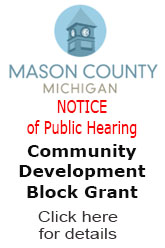 Scottville Commission approves resolution pursuing charter amendments.
Scottville Commission approves resolution pursuing charter amendments.
By Rob Alway
Rob Alway is editor-in-chief and owner of Mason County Press. He is also an elected city commissioner/mayor pro-tem of the City of Scottville. He writes this column as a way to communicate with constituents as a commissioner.
SCOTTVILLE — During the regular meeting of the City Commission on Monday, May 23, the commissioners approved a resolution that calls for seven charter amendments to be reviewed by the Michigan Attorney General’s Office and, if approved, to be placed on the Nov. 8, 2022 General Election ballot.
A municipal charter is the basic document that defines the organization, powers, functions and essential procedures of the city government, similar to a constitution. In the State of Michigan, the Home Rule Cities Act of 1903 allows for the establishments of municipalities to become chartered, giving those municipalities certain authorities to establish local ordinances and enforce those ordinances.
Charters may be amended two ways:
- Amendment. This is a correction of detail, such as a revision of language in a particular segment of the charter. The amendment must be approved through referendum (vote of the people).
- Revision. This is a fundamental change to the document. A revision is a re-examination of the entire document without any duty to maintain the form or structure of the charter.
A charter revision requires, first, a three-fifths approval by the city council, or by petition from the people, to declare for a general charter revision question be placed on the ballot. If the majority of voters approve the request, a charter commission is elected. The commission consists of nine people, elected through ballot. Those nine people have to have been residents of the city for at least three years. No city officer or employee, whether elected or appointed, shall be eligible to a place on the commission. State law allows for the charter commissioners to be elected during the same election as the question of revising the charter. If the charter question fails, then the commission election is voided. If the ballot question to proceed with a charter revision passes, the charter commission will convene and begin working on revising the charter. Once the revision is complete, the proposed revised charter will be put on the ballot.
If the proposal fails, the commission can choose to disperse or to present an amended charter proposal. The topic can only be brought to the voters three times. If no revised charter is adopted during three years following the adoption of the proposition to revise, then the charter revision commission shall terminate and cease to exist. A new proposal to revise may be adopted at any time after termination of a charter revision commission.
The City of Ludington is currently revising its charter. In May, voters chose to pursue this option and formed a charter commission. In Scottville, our commission has chosen to amend portions of our charter, and I will explain why.
The most challenging part of revising the charter is the charter commission. It is nearly impossible to get people to be involved in their local governments (which is a real shame). Our city, like many municipalities, struggles to get people to commit to serve on boards or to run for elected office. The City of Ludington only had four people officially petition to be placed on the ballot for its charter commission (with another seven people later request to be placed on the ballot as write-in candidates). A total of 11 people out of a city with a population of over 8,000. Scottville’s population is 1,200.
The Scottville charter is outdated. The current charter was adopted in the late 1950s. Many of the chapters are no longer applicable to modern governance of a municipality. Other portions of it are over-restrictive. It has been amended a few times over the years. The most recent amendment took place in 2020 when the voters approved consolidating the city’s two wards into one and, therefore, having all seven commissioners serve at-large. Prior, two commissioners each represented wards 1 and 2 and three commissioners served at-large (meaning they represented the entire city). The wards were divided east and west with Main Street as the dividing line. Refer to the previous paragraph where we discussed how difficult it is to get someone to run for office, and now limit it by what half of a town, that is one square mile, they live in.
Since being elected to the commission in 2018, I have witnessed the antiquity of our current charter many times. I have also witnessed how the 60-plus-year-old charter restricts the commission and administration from being efficient and moving forward. I believe a strong foundational document is important in municipal government. The city is required by law to have that document and there should be certain principles that require a vote of the people. But, we also live in a republic and the people elect representatives to establish laws as well.
The proposed charter amendments, that we hope to be on the November ballot, are not all the charter amendments we would like to see. However, making these changes require a lot of time and effort. The city’s ordinance committee has been tasked by Mayor Marcy Spencer to review the charter and make recommendations. This committee consists of Mayor Spencer, myself, and Commissioner Aaron Seiter. Sitting in advisory roles are City Manager Jimmy Newkirk, City Attorney Carlos Alvardo and City Police Chief Matt Murphy.
Many of the proposed changes deal with items that are outdated or that are superseded by state statute.
Let’s get to the proposed charter amendments (I am not going to type out all the proposed amendments nor am I going to type out the current charter. You may view the current charter at www.cityofscottville.org).
- Amendment 1 addresses changes to Chapter 3, topics such as the city’s tort liability immunity, record keeping, and the requirement of the charter itself. Most of the proposed changes do not directly change the specific topics but rather modernizes them. For example, since the charter was adopted in the late 1950s, Michigan passed the Open Meetings Act (OMA) and the Freedom of Information Act (FOIA). These state statutes are not addressed in the current charter and need to be stated in the revisions.
- Amendment 2 addresses changes to Chapter 4. Some of these items were already changed in the 2020 election but there were some “lingering” topics that needed to be cleaned up. This chapter deals with elections.
- Amendment 3 addresses changes to Chapter 7, city legislation. Again, some of this language brings the charter more in line with OMA. It also deals with some procedures of the Commission.
- Amendment 4 addresses chapter 8, justice court. This is an outdated chapter and the request is to repeal it as it is superseded by state law, except for the election of a constable. The city no longer has a need for a constable since it has a police department. The justice court is now handled on a county level and is known as the district court.
- Amendment 5 addresses chapter 9, the appointment of a county supervisor. Again, this is outdated. The county supervisors were the predecessors of what we now call the county commission. They are elected by the people and represent districts rather than specific municipalities. It is recommended to repeal this chapter.
- Amendment 6 addresses chapter 14, which discusses contracts and leases. This chapter explains the city’s power to make purchase or sell land, to form lease agreements and other various purchase powers. There are restrictions that should be in the charter. There are also changes that allow the City Commission more flexibility to establish ordinances instead.
- Amendment 7 addresses chapter 16, which discusses public utilities. Again, some of the language is dated and requires modernizing definitions.
These changes will now be sent to the Attorney General’s office. If the AG approves the changes, then the governor will sign off on them and that will allow the city to place the proposals on the November ballot. We expect to place more proposals on future ballots.



















.jpg)























 (1).gif)












.png)






